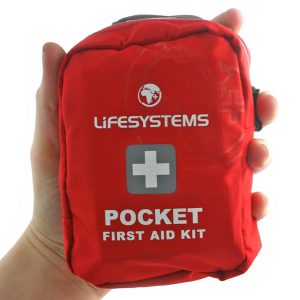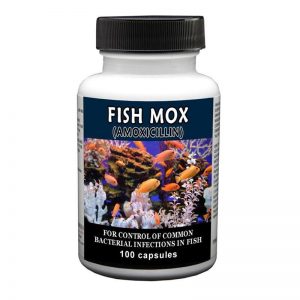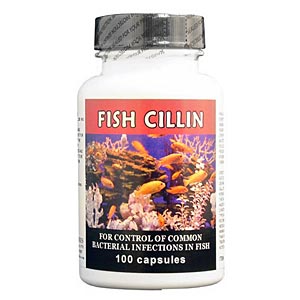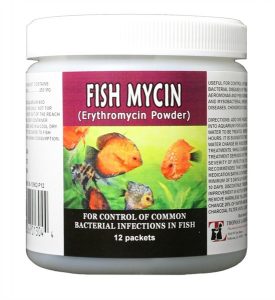 There’s no substitute for training so I’d recommend you take a basic first aid class at your local community center or American Red Cross. They’re usually free or very low cost and prepare you to treat common minor injuries. The types of wounds you’re likely to face are lacerations, eye injuries, puncture wounds, broken bones, and shock. If you can handle these, and recognize the wounds you can’t handle, then you’re better prepared than 90% of the population.
There’s no substitute for training so I’d recommend you take a basic first aid class at your local community center or American Red Cross. They’re usually free or very low cost and prepare you to treat common minor injuries. The types of wounds you’re likely to face are lacerations, eye injuries, puncture wounds, broken bones, and shock. If you can handle these, and recognize the wounds you can’t handle, then you’re better prepared than 90% of the population.
 First Aid kits don’t have to be huge. Assorted sizes of Band Aids, Generic Neosporin, alcohol wipes, an assortment of gauze, compression bandages, moleskin, and surgical tape should handle most simple injuries. Hardware is limited to a few safety pins, a pair of very fine tweezers for splinters, single edge razor blades, and a pair of surgical scissors to cut off clothing. Everything will fit into a large Ziploc bag.
First Aid kits don’t have to be huge. Assorted sizes of Band Aids, Generic Neosporin, alcohol wipes, an assortment of gauze, compression bandages, moleskin, and surgical tape should handle most simple injuries. Hardware is limited to a few safety pins, a pair of very fine tweezers for splinters, single edge razor blades, and a pair of surgical scissors to cut off clothing. Everything will fit into a large Ziploc bag.
A useful reference is “Wilderness Medicine: Beyond First Aid”, by Dr. William Forgey ($17 @ Amazon). Be sure to get the PRINTED version, not the eBook… Read it, tab it, and keep it in your first aid Ziploc in your “Go bag”.
Across the counter medications. You probably already have most of these at home but you’ll want to keep some in your “Go bag”.
Pain. Tylenol or the NSAID of your choice (Motrin, Advil, Aleve, Naprosyn).
Eye Care. Visine Dry Eye Relief for both dry eyes and to clear dust and particles.
Nasal decongestant. Sudafed and something faster acting like Afrin nasal spray.
Upset stomach. Tums, Nexium and Immodium.
Cold Symptom Relief. Alka-Seltzer Plus and Dayquil or Nyquil.
Itching or allergic reaction. Get tablets AND spray. The spray is good for poison ivy and rashes. Benedryl tablets are an excellent sleep aid.
Insect Bite relief. Campho Phenique or ammonia.
Jock itch, athlete’s foot or yeast infection. Terbinafine Hydrochloride (Lamisil), Miconazole (Monistat, Micatin), or clotrimazole (Lotrimin, Mycelex).
Tooth Ache. Oil of Clove will give temporary relief from toothache pain.
Insect Repellent. Anything containing DEET. Avoid the sprays because you’ll use them up too quickly. Liquids apply more precisely and are more cost effective.
In the absolute worst events it may a long time to get roadways cleared, vehicles running, power back on, and hospitals restocked and back in operation. We’ve seen this occur in Puerto Rico, where a full two months after the hurricanes the conditions had still not returned to normal. In survival conditions any injury can become infected and, without antibiotics, can be lethal. Unfortunately, antibiotics are tightly regulated in the U.S. and only filled with a prescription. However, there’s a workaround if you decide to stock a small quantity: Fish tank antibiotics. The drugs used in fish tank antibiotics are the same drugs you’d receive with a prescription, except they have not been certified for human consumption. The drugs come off the same USP grade production lines as the “certified” drugs and have the same purity, concentration, and cleanliness. Some of the antibiotics used by fish hobbyists include:
 Fish Mox Forte. 500mg tablets of Amoxicillin. Used to treat many types of infection caused by bacteria, such as tonsillitis, bronchitis, pneumonia, gonorrhea, and infections of the ear, nose, throat, skin, or urinary tract
Fish Mox Forte. 500mg tablets of Amoxicillin. Used to treat many types of infection caused by bacteria, such as tonsillitis, bronchitis, pneumonia, gonorrhea, and infections of the ear, nose, throat, skin, or urinary tract
Fish Flex Forte. 500mg tablets of Cephalexin (Keflex). Used to treat infections caused by bacteria, including upper respiratory infections, ear infections, skin infections, and urinary tract infections.
 Fish Cillin. 250mg tablets of Ampicillin. Used to treat many types of infections such as bladder infections, pneumonia, gonorrhea, meningitis, or infections of the stomach or intestines.
Fish Cillin. 250mg tablets of Ampicillin. Used to treat many types of infections such as bladder infections, pneumonia, gonorrhea, meningitis, or infections of the stomach or intestines.
Fish Flox – 250mg tablets of Ciprofloxacin (Cipro). Used to treat different types of bacterial infections. It is also used to treat people who have been exposed to anthrax or certain types of plague.
Fish Sulfa Forte – Each tablet contains 800mg of Sulfamethoxazole and 160mg of Trimethoprim. Used to treat a wide variety of bacterial infections (such as middle ear, urine, respiratory, and intestinal infections). It is also used to prevent and treat a certain type of pneumonia (pneumocystis-type).
 Fish Zole – 250mg tablets of Metronidazole. Used to treat bacterial infections of the vagina, stomach, liver, skin, joints, brain, and respiratory tract.
Fish Zole – 250mg tablets of Metronidazole. Used to treat bacterial infections of the vagina, stomach, liver, skin, joints, brain, and respiratory tract.
Fish Mycin – 250mg of Erythromycin Powder for respiratory tract infections, skin infections, chlamydia infections, pelvic inflammatory disease, and syphilis.